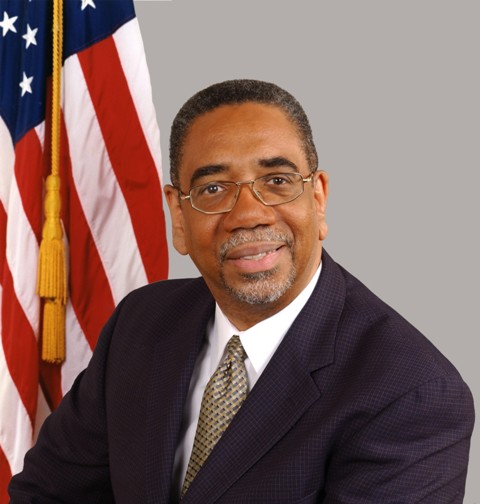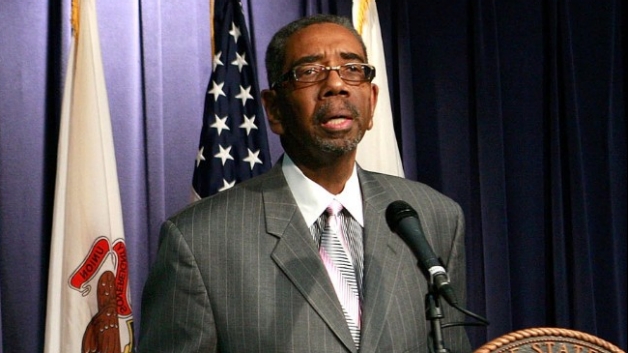
Congressman Bobby Rush

Rush at a press conference

Rush at a hearing
¥¥¥ Legends ¥¥¥
By Yussuf J. Simmonds
Bobby Rush
“The only man to beat Barack Obama in an election”
It is sometimes said that had Congressman Bobby Rush not bested Barack Obama in the 2000 primary election for Illinois’ 1st congressional district, then Obama may not have eventually become the 44th president of the United States. Rush is a member of the Democratic Party, the Congressional Black Caucus (CBC), and has been serving that district since 1993. Most of his district is located on Chicago’s Southside which has one of the highest concentrations of Black Americans in any congressional district–and houses some of the best known Black Americans including Rev. Jesse Jackson, the Honorable Louis Farrakhan and President Barack Obama (his private residence).
Born in Albany, Georgia, to Jimmy Lee Rush and Cora Lee, Rush moved to Chicago when he was about seven. He dropped out of high school and joined the U.S. Army in 1963 where he eventually received an honorable discharge in 1968. Later on, he earned a bachelors in political science from Roosevelt University; an M.A. in political science from the University of Illinois at Chicago; and another M.A. in theological studies from McCormick Theological Seminary. Rush is an ordained minister.
Throughout the sixties, Rush was involved in the civil-rights movement as a member of the Student Nonviolent Coordinating Committee (SNCC) working on civil disobedience and sit-in campaigns in the South. His early life and political activism started at home, literally. His mother was a Republican precinct leader, and that may have driven him to politics and activism: to politics, because of her Republicanism, and to activism, because of her Republicanism. He went to the Black Panther Party (BPP).
Rush co-founded the Illinois chapter of the BPP in 1968 and was made its “defense minister”–he even named his son, Huey, after the party’s founder and leader, Huey Newton. He started the nation’s first mass sickle cell anemia testing program. There are some similarities between reported statements of Rush as a BPP member, and Rush as a congressman.
BPP Rush: “We were reacting to police brutality, to the historical relationship between African-Americans and recalcitrant racist Whites. We needed to arm ourselves.” Congressman Rush: “My life’s mission, my life’s meaning, my life’s definition, is that I am a fighter for the people.”
When Rush began to dabble in politics as a congressional candidate, some of his BPP comrades were still referring to him as its “defense minister,” and he developed a reputation as someone who would support progressive policies and has never distanced himself from his BPP past. He once told a reporter, “We started glorifying thuggery and drugs. I don’t repudiate any of my involvement in the Panther party-it was part of my maturing.” As a matter of fact, his thrust into politics showed him building on his work and experiences with the BPP.
Rush made unsuccessful bids for the Chicago city council and the Illinois state house of representatives. But in 1983, he was elected a Chicago City Alderman, and the following year he became a Second Ward Committeeman. Also Rush’s political fortunes benefitted as an ally of Harold Washington’s campaign to become the first Black mayor of Chicago (1983 to 1987). His mission was clear as he decided to devote his political career to bringing a measure of power to those disfranchised from the political system.
In 1992, Rush ran as a Democrat in Illinois’ first district congressional primary; he narrowly defeated the incumbent who was mired in corruption and a scandal and has held that House of Representatives seat ever since. Now a nine-term Democratic congressman, Rush’s years in the House have given him senior status on committees and sub-committees–and along with another senior Democrat and CBC member, John Conyers–he is among the strongest congressional supporters of reparations for the descendants of African-American slaves. He once told a congressional hearing, “The future of race relations will be determined by reparations for slavery.”
Much of Rush’s political career was shaped by his early experiences in the BPP, his mother’s political influence and his activism. He was present when fellow BPP member Fred Hampton was killed in a police raid and he later made an official statement that the police had murdered Hampton. Later on, in the House, Rush proposed a government study to explore whether decriminalizing illicit drugs might help to reduce the violent “turf battle over drugs” pursued by gangs particularly in many of the nation’s inner cities. Then his own nephew was arrested and charged with murder in a case involving a South Side (Chicago) drug deal.
In 1999, one of Rush’s sons (he and his wife have six children) was shot and killed. He told supporters, “My son’s death was a senseless death. We’ve got to rid our communities of guns.” That may have been what made him one of the staunchest congressional supporters of gun control. He has proposed legislation that would regulate the sale and purchase of bullets, and has said, “Ultimately, I would like to see the manufacture and possession of handguns banned … that’s the endgame.”
Then he made two political moves that heightened his profile. He ran for mayor of Chicago but was unsuccessful against the incumbent Richard M. Daley, but–in political jargon–it was a free ride, he retained his seat in the House. In 2000, Rush took on then-state senator, Barack Obama for his congressional seat in the Democratic primary. Calling Obama a fool, Rush also said, “Barack is a person who read about the civil-rights protests and thinks he knows all about it.” Those statements generated immense controversy.
(However, when Obama ran for the presidency, Rush announced early that he would support Obama in the 2008 primaries, and later his presidential campaign, though he was a very close friend to Bill Clinton and Hillary Rodham Clinton).
In congress, Rush serves on the powerful Committee on Energy and Commerce, one of the oldest committees in the Congress. In addition, he is also a member of the Subcommittee on Commerce, Manufacturing and Trade; the Subcommittee on Communications and Technology; and the Subcommittee on Energy and Power.
According to record in Congress, some of Representative Rush’s work in the House are as follows:
¥ He sponsored the Melanie Blocker-Stokes Postpartum Depression Research and Care Act, named for Melanie Blocker-Stokes, a Chicago native who jumped to her death from a 12th story window due to postpartum depression. The bill would provide for research on postpartum depression and psychosis and services for individuals suffering from these disorders.
¥ He sponsored legislation re-designating two United States Postal Service facilities in Illinois’ 1st district as the James E. Worsham Post Office and the James E. Worsham Carrier Annex Building.
¥ He sponsored the Nursing Relief for Disadvantaged Areas Act passed in 1999. The law temporarily addressed the nursing shortage by providing non-immigrant visas for qualified foreign nurses in the Englewood neighborhood of Chicago and was reauthorized in 2005.
¥ The Children’s Health Act passed in 2000 incorporated Rush’s Urban Asthma Reduction Act of 1999, amending the Preventive Health and Health Services Block Grant program and includes an integrated approach to asthma management.
¥ He initiated the Chicago Partnership for the Earned Income Tax Credit, an ongoing program designed to help low-income working Chicagoans receive the Earned Income Tax Credit, a federal income tax credits.
¥ He has brought close to $2 billion[of federal funding since his election, including a $1 million federal grant from the Office of Naval Research to the Illinois Institute of Technology to develop better ways to assess the presence of chemical and biological agents.
¥ He introduced the Blair Holt’s Firearm Licensing and Record of Sale Act of 2009 on January 6, 2009. This bill, if signed into law would require all owners of hand guns and semiautomatic firearms to register for a federal firearms license. All sales of the subject firearms would have to go through a licensed dealer. The bill would also make it a criminal act not to register as an owner of a firearm. H.R. 45 was referred to the judiciary committee in 2009.
Rush has continued his activism–outside of Congress and inside the Congress. In 2004, he was arrested for trespassing while protesting the genocide in Darfur and other violations of human rights in Sudan in front of the Sudanese Embassy. In 2007, he opposed President George W. Bush’s proposed 20,000 serviceman troop surge in Iraq saying that the presence of the U.S. troops in Iraq is the greatest catalyst of violence in that country, and advocated a political resolution of the Iraq situation. Towards the close of his speech, Rep. Rush stated, for the congressional record that the troop surge would only serve to make the Iraqi situation more volatile.
After then-Senator Obama became the President-elect, Rush said, during a press conference, “With the resignation of President-elect Obama, we now have no African American in the United States Senate, and we believe it will be a national disgrace to not have this seat filled by one of the many capable African American Illinois politicians.” Roland Burris, a former African-American Attorney General of Illinois, was eventually appointed to the seat.
In the wake of the Jan 2010 earthquake that devastated parts of Haiti, Rush led a 10- member House delegation to examine recovery efforts since the earthquake had reportedly claimed the lives of 210,000 people. The delegation was part of the House Democracy Partnership (HDP), a legislative exchange and capacity-building program established by the U.S. House of Representatives five years prior. They worked to help the massive rebuilding effort in that island-nation.
Afterwards Rush issued the following statement: “I want a first-hand look at how the Haitian Parliament is meeting the needs of the Haitian people in the wake of this devastating tragedy and I want to see the progress that’s been made to stabilize Haiti, he said. “Not only were thousands of lives lost but the political and economic infrastructure of the country was also disrupted. This will be a long process. We will meet with members of parliament, U.S. embassy officials and visit relief camps so we might access how well our intervention is going.”
Now in his 19th year in Congress, Rush has been a leveling force in Congress after having once been on the outside, looking in. He is a member of Iota Phi Theta fraternity and, as an ordained minister, has called on Christians and non-Christians alike to read the Bible.






